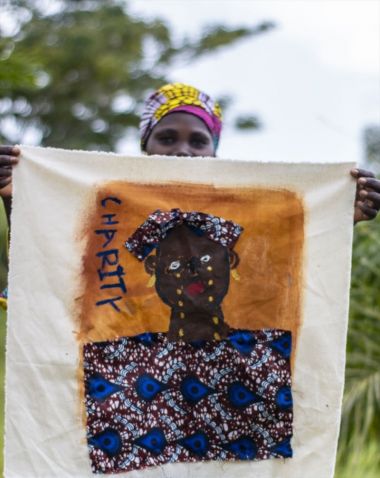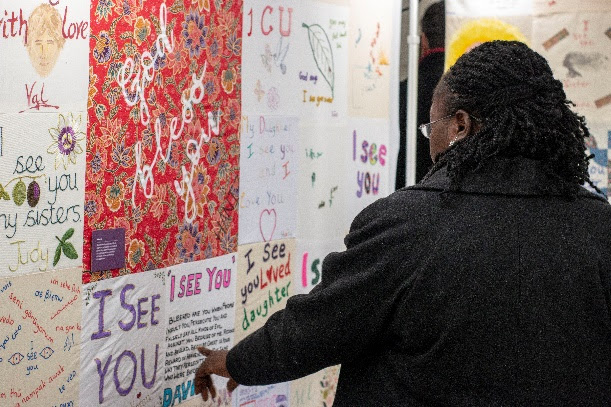The 'double vulnerability' of persecuted Christian women

Last year, the Bishop of Truro published a monumental review into the persecution of Christians. The findings were stark: anti-Christian persecution is spreading and increasing in severity to the point where in some regions it is coming close to meeting the UN definition of genocide.
While all persecution is an ordeal for those bearing it, Open Doors is trying to shine a light onto the "double vulnerability" of Christian women who are at risk of violence or harassment not only because of their faith, but because of their gender.
"Men are more likely to experience a 'visible' form of persecution - they are more likely to be killed, imprisoned or conscripted for their faith," says Izzy Stark, from the Open Doors UK Advocacy team.
"Women, on the other hand, are more likely to experience persecution that is 'hidden' - they're more likely to be kidnapped, experience sexual violence or be forced into a marriage.
"Therefore, we don't often hear their story or know how insidious it is."
Nigeria is one such country where this kind of difference in the experience of persecution can be seen.
There, armed Fulani herdsmen and members of the Boko Haram terrorist group have been specifically targeting Christian villages.
Izzy was in the country recently to meet women affected by the attacks. 'Christie', whose name has been changed for security reasons, was targeted even before the attack on the whole village, because she was the pastor's wife.
Horrifically, she was kidnapped by Fulani herdsmen with her one month old son and raped. She was held for three months until her husband was able to pay the ransom. But when she came back with the warning that her kidnappers were planning an attack on the whole village, nobody believed her. A week later, the Fulani came and burned the whole village down.
"In many countries where persecution occurs, women are often not listened to; they're in a culture already where they are so vulnerable. And if you connect that with their faith, they have a double vulnerability.
"They suffer both for their gender and then for their faith in a very specific but much more hidden way."
Understandably, it's hard for women like Christie to talk about what's happened to them. Open Doors' partners in Nigeria run a trauma centre that hosts weekly workshops for women who have experienced sexual violence either by Boko Haram or Fulani herdsmen.
They come to these workshops from all over the country, often feeling very anxious and apprehensive. The workshops are a vital chance for them to work through their experiences and listen to each other's stories.
"I met a lady there whose husband had been killed by Boko Haram and she hadn't told anybody in two years," recalls Izzy.
"Actually giving them space to tell their stories has an enormous impact on them. Many of them are going through grief, many of them have lost their husbands. They go through the process of forgiving and in one session, they take their pain to the cross and give it to Jesus. It's very powerful."
But the programme is not only about trauma healing. After the women have completed the course, the centre's leaders will go and visit them in their villages to provide additional support like microloans to start their own businesses or help with the schooling of their children.
Trauma healing is a core part of the response to Christian persecution worldwide where it is violent in nature, like in parts of India or the Middle East, and in conflict zones. In other places, persecution manifests itself as economic deprivation or gender inequality.
Specifically in the Middle East, Open Doors is supporting social enterprises to help people find community and a voice. In places where economic deprivation and forced marriage are prevalent, a lot of the organisation's work is focused on advocacy.
In Pakistan, Open Doors estimates that around 700 women and girls are kidnapped every year for their faith. In Egypt, too, many younger Coptic Christian girls have been kidnapped because of their faith and been forced into marriage. In India, there have been reports of pastors' daughters having been kidnapped or even burned alive as a threat to the church.
In other cases, though, girls from non-Christian families are kept under house arrest after converting to Christianity. 'Tarah' in India was 15 when she became a Christian. She was essentially enslaved within her house by her own family and wasn't allowed to leave; nor was she given much food.
The atrocities affect all ages. For abducted girls, there is the additional hardship of the stigma they face when they return to their communities.
Izzy witnessed this stigma at work in Nigeria.
"Stima's a huge issue," she says.
"In Nigeria, Esther was kidnapped by Boko Haram for three yeras and fell pregnant. She managed to escape and return to her family, bringing baby Rebecca with her. But they refused to call her Rebecca and instead called her 'baby Boko'.
"The stigma that the women face on their return to their families and communities is huge. Often they're not accepted by their husbands or their families."
That is why the trauma counselling doesn't only work with the women but their husbands, enabling forgiveness and reconciliation to take place.
In addition to working with the husbands, church pastors are being engaged with to change perceptions and attitudes within the wider community.

"It is so important to work with the pastors of the churches to make it a 'whole family' healing process, as it were, and help people to understand that the women need specific healing because of their experiences," Izzy said.
Open Doors is trying to raise awareness of the plight of Christian women and, importantly, is campaigning for the Foreign and Commonwealth Office to recognise faith as a specific vulnerability along with others that already enjoy this status, such as age, disability and gender.
This is crucial because it would mean more support for faith-based responses in international development.
"It wouldn't be appropriate at the trauma healing centre in Nigeria, for example, to run secular healing for these Christian women," Izzy explains.
"In order for appropriate trauma healing to occur, faith needs to be recognised as part of that process along with their gender. The two vulnerabilities coexist together and that needs to be acknowledged in order to sufficiently equip these local faith leaders working in trauma counselling."
But Izzy has a call to the church too. Last November, Open Doors displayed a moving handmade petition at Westminster Abbey. The "We See You" petition was formed of 16,000 individually stitched messages of support for persecuted women.
The petition wasn't only a message to Christian women worldwide suffering for their faith; it was also a message to church leaders to be compassionate and Christlike in their response.
"The petition was primarily inspired by the story of Hagar in Genesis, who cries out that God is 'Elroy' - the God who sees me.
"This scripture is relevant to forms of persecution that are very hidden simply because these women are so often not seen.
"Their stories should be told and heard but the reality for these women is that they are not, often because they live in a society where, already, they are not heard simply because they are women.
"We want to say that there is a God who sees you and we want to equip the Church to commit to saying not just that we are seeing you right now, and hearing your story and praying, but that we intentionally choose to look at you and see your experience.
"Christie went back to her church and told them that the Fulani were coming, and they didn't listen to her. We want to strengthen the Church in its response to say: we hear you and we'll respond."











